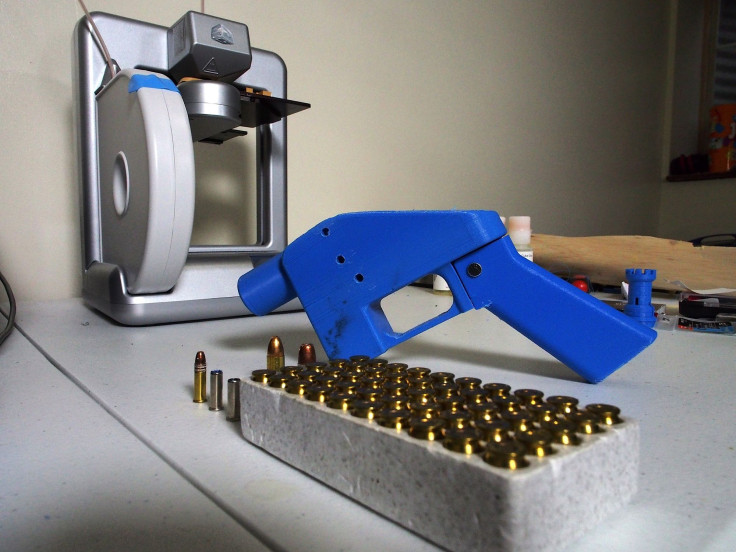3D-Printed Gun Designs Available For Download Freely, Court Order Not Wide-Ranging

Even as a Seattle federal judge issued a temporary restraining order on the release of downloadable blueprints of 3D-printed plastic guns by a company, a new website — created by a coalition of California gun groups — posted downloadable gun designs online.
Breaking: a coalition of California gun groups has created a new site called https://t.co/GJ3YC3Pavu where they've posted downloadable gun designs. pic.twitter.com/iz13fnquL5
— Stephen Gutowski (@StephenGutowski) August 1, 2018
The temporary court order, while restricting Defense Distributed — the Texas-based company whose website had to be taken down due to the recent ruling — from publishing the blueprints online, does not stop other similar websites from popping up. The website called CodeIsFreeSpeech mentioned on their homepage they are a public portal for truthful, non-misleading, non-commercial speech and information that is protected under the United States Constitution.
The new website had blueprints of around seven guns, including the controversial “The Liberator” that was in the forefront of the legal battle involving the release of the blueprints online. The single-shot pistol, made almost entirely out of ABS plastic, could be printed on a 3D printer at home. Since they are made of plastic, they would be untraceable and undetectable as well. This means the gun could be sneaked in past metal detectors.
The website, the description read, was a project by Firearms Policy Coalition, Firearms Policy Foundation, The Calguns Foundation, California Association of Federal Firearms Licensees, and other individuals who are “passionate about the Constitution and individual liberties.”
The newly popped up website also thanked Cody Wilson and Defense Distributed for their courage, passion, innovation, and inspiration.
The ruling in question came after a lawsuit was filed by eight states and the District of Columbia on Monday, which sought to block the federal government’s settlement with Wilson and his company that made the plans available online.
Wilson and Defense Distributed had reached a settlement with the federal government in June that gave permission to the company to make the plans downloadable Wednesday.
But, according to journalists, the blueprints of the guns were available for download on the website since Friday, which was five days prior to the announced release date. It was unclear as to how many people might have already downloaded the prints.
Hey, fellow journos (except @cfarivar, you're cool) -- the 3D-printed gun plans have been available to download since Friday.
— Sean Hollister (@StarFire2258) July 31, 2018
There's no longer a Aug. 1 deadline to beat. No longer something that can be blocked or put on hold.
The ruling by Judge Robert Lasnik temporarily blocked the settlement arguing the freely available technology could aid terrorists and criminals in easily manufacture firearms.
"This is a nationwide ban. ... It takes us back to a period of time before the federal government flipped on their policy regarding these 3D ghost guns," Washington Attorney General Bob Ferguson said. "What it means is if anyone posts this information online, they are in violation of federal law and can suffer very serious consequences. So, it makes it unlawful to post that information and make it available to the public."
Ferguson had earlier said he was leading the lawsuit against allowing the company to make blueprints of 3D-printed guns available for download.
“These downloadable guns are unregistered and very difficult to detect, even with metal detectors, and will be available to anyone regardless of age, mental health or criminal history. If the Trump Administration won’t keep us safe, we will,” he said.
Senate Democrats had introduced a bill that would make publishing 3D-printed online illegal on Tuesday. Several lawmakers criticized President Donald Trump also and asked him to reverse the agreement with the company.
"In the United States, it's currently illegal to own or make a wholly plastic gun of any kind, including those made on a 3D printer. The administration supports this nearly two-decade-old law, and will continue to look at all options available to us to do what is necessary to protect Americans while also supporting the First and Second Amendments," Deputy Press Secretary Hogan Gidley, responding for the president, told reporters.
On Tuesday, Trump tweeted he was looking into the idea of 3D plastic guns beings sold to the public. He added he had spoken to the NRA and that the idea didn’t make much sense.
"We don't agree with President Trump very much," Washington state Assistant Attorney General Jeff Rupert said, "but when he tweeted 'this doesn't make much sense,' that's something we agree with."
© Copyright IBTimes 2024. All rights reserved.




















